Tumpline March 2016
Published: Thu, 03/31/16
Get news, announcements, and the latest camp scoops in our newsletter. View a web version of this issue
 |
|
 |
|
Portage Jim Tilley
From Lessons from Summer Camp Jim Tilley earned a doctorate in physics from Harvard and worked on Wall Street for twenty years. The first two collections of his poetry were published by Red Hen Press - In Confidence in 2011 and Cruising at Sixty to Seventy in 2014. During the summer of 2013, he returned to Camp Nominingue for the first time since the 1960s. A result of that return visit is his forthcoming collection, Lessons from Summer Camp, from which this poem is taken.  Before departing camp for the wild, a Counselor prepares his canoe for portaging with rope, two paddles, and a tump strap. He uses the rope to rig the portage thwart and attach the tump strap at each end to the gunwales just forward of the thwart. He inserts the blades of the paddles into the rigging and ties the shafts to the sides of the bow seat. With knees bent, he stands at the middle of the canoe, grasps it with both hands at the near gunwale and lifts it to rest on his thighs. Leaving his right hand on the near gunwale, he reaches over with his left and grasps the far gunwale. He rocks the canoe gently on his thighs, takes a deep breath, and in a single, smooth motion rolls it upside down while raising it clear over his head with both arms extended. Then lowers it slowly and exhales, letting his head pass through the gap between the paddles so that their blades rest on his shoulders. He places the tump strap between the blades and across the top of his head and adjusts the tumpline until the canoe lies barely above his shoulders with the tump taut. 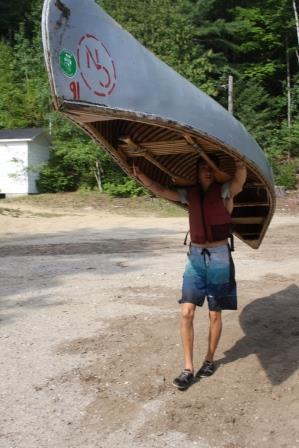 At the start of the trip’s first portage, he will check his preparation by standing for a minute, arms hanging loosely at his sides, the inverted canoe perfectly balanced on his head, its full weight distributed down his spine and throughout his body. Then he’ll depart from the lakeside put-in and start along the trail, man and canoe as one. 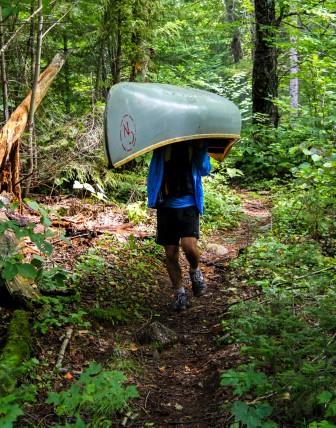
Lessons from Summer Camp Jim Tilley
A fifty-year look backward to the days spent at summer camp and the life lessons they taught us without our knowing it.In Lessons from Summer Camp, Jim Tilley takes a fifty-year retrospective look at a ten-year period during his childhood and adolescence to discover what summer camp was really about. In both a wistful and an appreciative look back on the days of our youth, the poems reminisce on the memorable events of those summers, from fire-lighting contests at Council Ring to races in war canoes during Tribal Games, learning to swim, and writing letters home, to the inevitable sadness of departing at the end of summer, saying goodbyes at the station until next year. The poems evoke memories of experiences we've all shared, and bring perspective to how lessons from summer camp often become apparent only later in life.  "Reading this book is like returning to those sometimes fraught but mostly carefree days of summer camp--or, for the uninitiated among us, like taking our blindfolds off and discovering that vivid world for the first time. Tilley's poems are refreshingly direct, maybe because, as he says in 'J-Stroke and Sweep,' 'You can't see the metaphor when you're a Camper.' He sees the metaphors now but doesn't bear down on them too hard, and the 'lessons' of the title never seem forced. Jim Tilley earns a '3rd feather' for this third book." ---Jeffrey Harrison "Jim Tilley's Lessons from Summer Camp would make Wordsworth proud since it is affection recollected in tranquility. Boys leave a ceremonial world of finger sandwiches and afternoon tea to step into a greener and wider one. There Tilley and his friends learn the value and limitations of teamwork and play games that sort out leaders from followers. As sunlit as these poems can be, a prescient and observant Tilley also finds that sometimes life is 'always a night in the wilderness.' ---Ron Koertge  Lessons from Summer Camp will be published in Spring 2016 and, in the spring, we will announce in this newsletter how you may purchase this book. Maison-de-Pierre, 1957 Part X Andy Webster
John Blachford drove up to Camp Nominingue on a Friday and by noon the next day, we had decided to embark on a more ambitious canoe trip than either of us had ever been on. This decision on my part meant that I must quit my counselling job, but the money I would have to forfeit was inconsequential when I compared it to the overall experience of the trip we were to take. The following is an account of the 14 days we spent out in the bush. Thursday, August 15 We climbed out of our sleeping bags at 7:00, had breakfast and finished the first portage around the rapids. The trail remained good until the end of the rapids. We put the canoe in the water for the first time since three o’clock the previous afternoon and paddled to a set of falls. Here there was evidence of MacLaren lumbering operations as we found dynamite boxes and logging poles as well as observing a M sign stamped on the logs that were swept to shore at the bottom of the falls… We passed a big fishing cabin on Porcupine and took out at the end of the lake where we discovered a car, and then followed a road which forked into another road going south. We cut right at the fork and searched about an hour for Lake Windigo, which the map indicated was on the left side of the road. Unable to find the lake, we walked back a little ways and put in on the muddy, shallow stream which led into Windigo. We pushed and paddled our way down the stream to the lake, and then held our breath, hoping that a trail would exist to connect Windigo to Brockaby. The trail, unmarked on our obsolete map, did exist and we happily almost ran over the two mile portage to the small lake with no name, which is a quarter of a mile portage away from Brockaby. Here, there was a big, well-equipped cabin. We walked into the cabin just as it started to pour rain. 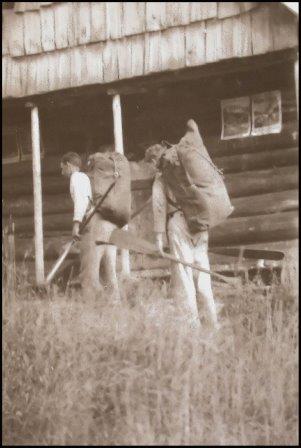 If our optimism had been high the night before by the river, it was even higher that night as we walked out of the rain into the cabin and prepared our bedding and supper. By our travel that day, we had covered another uncertain part of the trip and we had covered it without a great deal of trouble. Moreover, we had come to within sight of our goal, Lake Rupert. We unsuccessfully tried to light the propane stove in the cabin, finally gave up and used the wood stove, which by the end of an hour, gave off sufficient heat to warm up the cold cabin and dry our wet clothes. 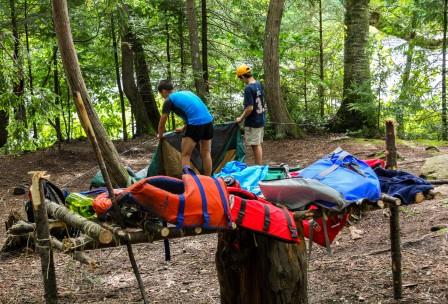 At the time, I wondered whether this was in the true spirit of canoe-tripping; and if bedding down in some unoccupied cabin violated the spirit and the rules of a canoe trip. I had been taught at Camp Nominingue that to occupy and sleep in a cabin was not the right thing to do, but I think the rule was impressed on all of us because sometimes counsellors and their campers did harm or damage to the cabins which they occupied. I had been taught that when one reaches one’s destination for the night, the first and most important thing to do was to set up a tent in case of rain. On most of the canoe trips I had been on, I liked to sleep out in the open with neither canoe nor tent enclosing me, only using the tent if it should start to rain. John and I occupied cabins five of the thirteen nights we spent in the bush. Two of those five nights, we had been granted permission. We never broke into a cabin, although one time, I was tempted to do so. John restrained me, citing cases where this had been done and trouble had resulted. On long trips such as this, the cabins were a great help to us, providing shelter when we had paddled into a camp site late and tired from the day’s travel. I somehow felt that these cabins in the bush should be unlocked and open to our use by virtue of some unwritten law which stated that the weary traveller and canoe-tripper should be allowed to use these cabins. 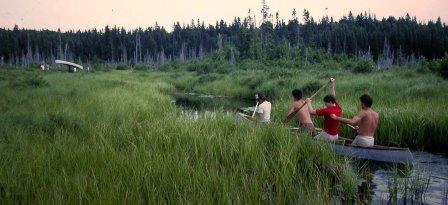 We used the cabins when it was convenient to us and I don’t think we abused this “unwritten law” by damaging property within or around the cabin. In these five cases, I was happy to find shelter under a dry roof, but the spirit of the outdoors, of sleeping out in the open under the stars and in the light of the moon. Never lost its appeal. This appeal was reinforced that night on the Lievre, by the rushing, noisy water and the tall spruce. I believe that the spirit of sleeping out in the open should be stronger than any desire to sleep in a musty, yet comfortable cabin. I learned on that trip that a good canoe-tripper must not come to depend on cabins, but that he should develop the ability to choose a good camp site and then prepare that site so that it will be comfortable barring any circumstances; driving rain or strong winds, and that the spirit within him should always favour this kind of setting. 2016 Registration – Inscriptions 2016
Each fall, we open registration on November 1st. This year, the challenge was to prepare the web-based forms after working with access-based forms for the last few years. The early results appear positive and we haven’t heard of too many issues with the new system – our goal was certainly to make the registration system work as smoothly as possible for our clients. The start of registration is always an exciting time, filled with optimism as well as some apprehension – if we
build it, will they sign up…This year, LIT registration was the first to fill-up. After filling the 10 spots available in the LITJ session, we opened a waiting list. Within twenty-four hours, there were already 10 people on this list and we promptly opened and filled a second group of 10 LITs. Pretty quickly, the August LIT program also filled up. Currently, registration is running well ahead of last year. Only a few places remain in the 8-day program for 7-9 year olds. 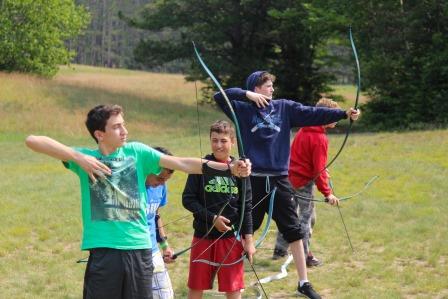 Chaque automne, nous commençons à prendre des inscriptions pour le camp le 1er Novembre. Cette année, le défi consistait à préparer des formulaires basés sur le Web après avoir travaillé avec des formulaires basés sur « access » les dernières années. Les premiers résultats semblent positifs et nous n’avons pas entendu parler de problèmes avec le nouveau système - notre objectif est certainement d’utiliser un système d’inscription facile pour nos clients. L’arrivée des premières inscriptions est toujours un moment excitant, rempli d'optimisme ainsi d’une certaine appréhension – « si nous le construisons, vont-ils s’inscrire ... » Cette année, les inscriptions au programme leader-en-formation sont arrivées rapidement. Après avoir rempli les 10 places disponibles dans la session LITJ, nous avons ouvert une liste d'attente. Dans les premières vingt-quatre heures, il y avait déjà 10 personnes sur cette liste et nous avons ouvert et rempli un deuxième groupe de LIT au mois de juillet. Assez rapidement, le programme au mois d’août, LITA, s’est également rempli. Présentement, les inscriptions sont bien en avance des inscriptions à pareille date l'année dernière. Il ne reste que quelques places au programme de 8 jours pour les 7-9 ans. 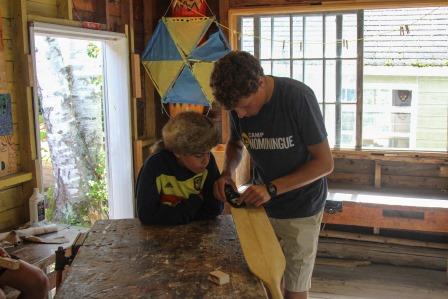 Nominingue Family Camp Carey Knight (Berkowitz) 2015
Whether newcomers, former campers and staff, or families who always wanted to share their sons’ outdoor experiences, this is a perfect way to spend a few days in the country, trying new sports, relaxing by the peaceful lake, bonding with family and new friends or enjoying time alone… I spent 10 wonderful summers as a staff child in the 1970’s and never found a camp that had as much spirit and simplicity as Nominingue. The respect for nature, camp-craft skills, and watersports have been lifelong sources of pride and connection with Canada. I would even say the simple chapel in the woods was an early spiritual experience that laid the ground to me becoming a chaplain (and rabbi). My only worry returning with my mother and three children this year was that it would seem smaller and less enchanting than I remembered it. The worries were unfounded- the nature walks, wholesome staff and jolly evening programs were as fun as ever, and the food even healthier, more varied and plentiful than I remember. 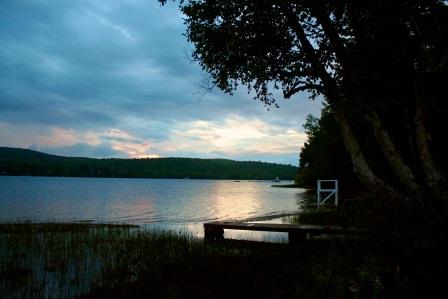 Incredibly, there was something for all our ages and stages… when else would my son ever say “Mum, let’s go for a bike ride together?” The flexibility and choice of activities, polite and enthusiastic staff, experienced senior staff, and overall sense of tradition really show, and I would recommend this experience wholeheartedly. Alumni Association News / Nouvelles de l’association des anciens
Please share with us news that you would like to include in the Tumpline that you think might be of interest to other Nominingue alumni.SVP envoyez nous des nouvelles que vous aimeriez inclure dans une prochaine édition du Tumpline. 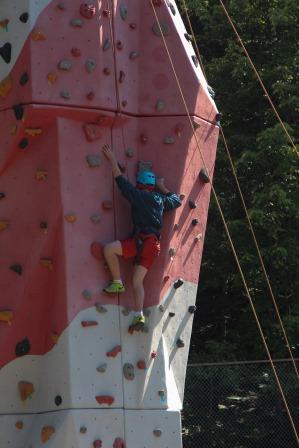 Alumni Socials Each spring and fall, we try to hold at least one Alumni Social in Montreal, Ottawa and Toronto. It is always great to renew with recent and less recent alumni. Dates and locations of future get-togethers will be posted on Facebook on the Camp Nominingue Alumni page or on the Alumni Socials page. To get involved with CN Alumni Association, please contact John Christou at john@prospectorfilms.ca. Tumpline Submissions - Soumissions pour cette lettre de nouvelles
We are looking for submissions for our newsletters from campers, staff and parents… from this summer, as well as from recent and less recent alumni. These submissions may be general memories of camp experiences or specific memories about a canoe trip, about a favourite program or a funny experience. Please send your submissions to grant@nominingue.com. You may submit your stories and memories in English, French or Spanish. Nous sommes à la recherche de textes de campeurs, parents et de moniteurs de l’été 2015… et de souvenirs de nos anciens campeurs et moniteurs des années récentes et moins récentes. Vos textes peuvent décrire vos expériences en générale ou une excursion de canot, un programme favori ou une expérience drôle. SVP envoyez votre texte par courriel à grant@nominingue.com. Votre texte peut être écrit en français, en anglais ou en espagnol. |
|
|
Camp Nominingue | Tel. 450-267-2555 | Toll-free 866-910-1551 (Canada & US)
Email: info@nominingue.com | Web: www.nominingue.com |
|
|
This e-mail is destined to all campers, parents and counsellors, current and alumni. If you would prefer not to receive occasional messages from us, please unsubscribe using the link below this message.
Ce courriel est destiné à tous les campeurs, parents et moniteurs, actuels et anciens. Si vous voulez vous désinscrire de cette liste d’envoi, svp cliquez en bas de la page.
Camp Nominingue
Winter Address: 112 rue Lippée, Les Coteaux, QC J7X 1J4 Summer address: 1889, chemin des Mésanges, Nominingue, QC J0W 1R0 |
|